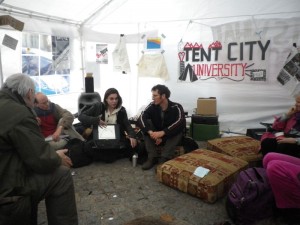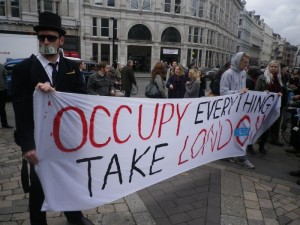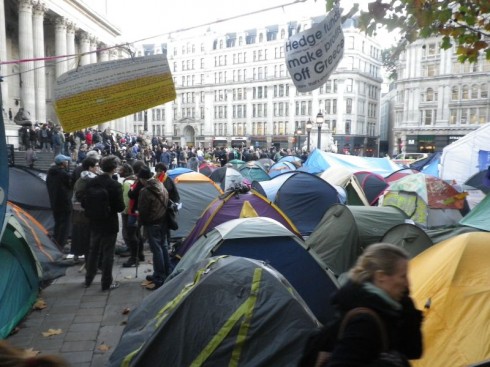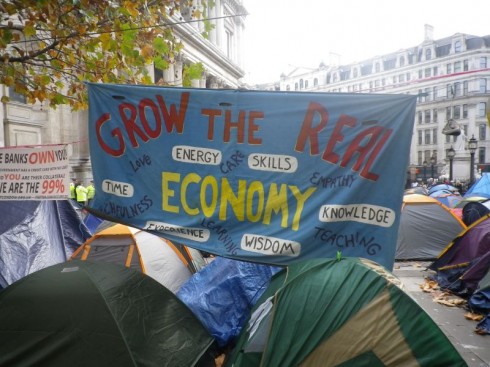10 Nov 2011
Some reflections on a day at Occupy LSX at St Paul’s Cathedral
 I spent most of the day yesterday around St. Pauls’ Cathedral visiting the Occupy London Stock Exchange camp there. With hindsight I probably didn’t pick the best day. November 9th was also the day of the student protests and the police presence in the city was the biggest I think I have ever seen in my life. From the moment I left St. Pauls’ tube station, there were ranks of police, policevans, dogs, horses, all kinds of different police units all over the place. During the day I was often reminded of ‘Apocalypse Now’ or ‘Boyz in the Hood’, given the constant noise of helicopters overhead, which at times, even made conversation difficult.
I spent most of the day yesterday around St. Pauls’ Cathedral visiting the Occupy London Stock Exchange camp there. With hindsight I probably didn’t pick the best day. November 9th was also the day of the student protests and the police presence in the city was the biggest I think I have ever seen in my life. From the moment I left St. Pauls’ tube station, there were ranks of police, policevans, dogs, horses, all kinds of different police units all over the place. During the day I was often reminded of ‘Apocalypse Now’ or ‘Boyz in the Hood’, given the constant noise of helicopters overhead, which at times, even made conversation difficult.
 The student march had been refused permission to march past St. Pauls, and the police were keen to prevent that from happening, as well as also to stop a repeat of the rioting that was seen at the same protest last year. Shortly after I arrived, many of the people at the camp set off on a march to meet the student demonstration. I set off with them for a while, but knew I had to get back to do my talk, and was separated from the main demonstration by deep rows of police who blocked the road. It was a pretty scary scene I must say, very heavy.
The student march had been refused permission to march past St. Pauls, and the police were keen to prevent that from happening, as well as also to stop a repeat of the rioting that was seen at the same protest last year. Shortly after I arrived, many of the people at the camp set off on a march to meet the student demonstration. I set off with them for a while, but knew I had to get back to do my talk, and was separated from the main demonstration by deep rows of police who blocked the road. It was a pretty scary scene I must say, very heavy.
 It all meant that when it came to giving my talk back at the OccupyLSX camp there were only about 20 people. Shaun Chamberlin, author of ‘The Transition Timeline’ was there too, so we co-presented the session. I talked about peak oil, climate change and the economic crisis, and how Transition weaves them together. I ran through a number of different projects that Transition groups are doing and how they are starting to take the step across into creating social enterprises and enabling inward community investment. Shaun talked about the different cultural stories we tell ourselves, and how Transition represents a new one. The talk was hard on the tonsils, trying to make myself heard above the helicopter noise (!), but there were some interesting questions and discussion afterwards.
It all meant that when it came to giving my talk back at the OccupyLSX camp there were only about 20 people. Shaun Chamberlin, author of ‘The Transition Timeline’ was there too, so we co-presented the session. I talked about peak oil, climate change and the economic crisis, and how Transition weaves them together. I ran through a number of different projects that Transition groups are doing and how they are starting to take the step across into creating social enterprises and enabling inward community investment. Shaun talked about the different cultural stories we tell ourselves, and how Transition represents a new one. The talk was hard on the tonsils, trying to make myself heard above the helicopter noise (!), but there were some interesting questions and discussion afterwards.
Later in the afternoon Billy Bragg, a long-time hero of mine, played in front of St Pauls’ which was a delight for this old fart who first saw him back in the 80s doing miners’ strike benefits and who WAS ‘The Saturday Boy’.
Some voices of Occupy LSX
During the day I tried to gather some voices from the camp. Why were people there? What were they getting out of it? What was it all about? I hope the following short audio pieces, from interviews with an unscientifically chosen sample, capture the atmosphere there and a diversity of voices. Firstly I talked with Chris, who has been there since the start. Why was he there?
I met Esther, from Spain, who had also seen the demonstrations there during the summer, and who reflected on how they were similar, and how they were different…
Frannie Owen, from Bridport, had come up to visit for the day and found herself manning the Information Tent all day!
Nathan Cravens from Texas was running the Occupy LSX library (to whom I donated a copy of ‘The Transition Companion’:
Some reflections
In my first while at Occupy LSX, I confess to feeling a bit disappointed. On first impressions, opening a space for people to voice their discontent and their disquiet with what is happening means that in rush all sorts of assorted issues, campaigns and disaffected voices. There were 9/11 conspiracy theorists, the Zeitgeist movement, Socialist Worker, all manner of single issue groups as well as just some very angry people with a lot of chips on their shoulders. I had been expecting, from what I had read online over the past few weeks, a very focused and cogent common take on the economic crisis, but many of the people I spoke to, while they had a strong sense that the economic system is broken and needs fixing, weren’t able to really explain why, or what an alternative vision would look like other than being fairer and more equal. There was also clearly, as has also been observed at other Occupy camps too, a problem with people with drink and mental health issues who had become involved with the camp.
 However, as the day passed, it all started to make sense. What Occupy is doing that matters so much is that it is holding a space. It is holding a space where the discussions can take place on their own terms about what is broken and what needs fixing. It is underpinned by a realisation that this is a crucial time of change where everything is on the table, where business-as-usual is no longer an option. It isn’t making demands because that would put the power in the hands of the people in power to decide whether or not to respond to them. It is holding the space for the conversations, and is doing so on its own terms. I admire that.
However, as the day passed, it all started to make sense. What Occupy is doing that matters so much is that it is holding a space. It is holding a space where the discussions can take place on their own terms about what is broken and what needs fixing. It is underpinned by a realisation that this is a crucial time of change where everything is on the table, where business-as-usual is no longer an option. It isn’t making demands because that would put the power in the hands of the people in power to decide whether or not to respond to them. It is holding the space for the conversations, and is doing so on its own terms. I admire that.
As with the roads protests I was involved with in the early 90s, keeping a gathering like that together through inclement weather, public scorn, harassment and so on takes people with a lot of guts. Personally I have never lived through a revolution, and I’ve never seen one, but there was a taste there, for me, of what the beginning of one would feel like. Everyone I spoke to felt that the camp was there to stay, and that every day more and more people arrive to offer their support (and their money, and vegetables, and socks, and cakes…). This creation of a sense of possibility, of not waiting for permission, is one of the things that Occupy and the Transition movement have in common it seemed to me.
The systems for managing people with drink, drug and mental health issues began to come into focus, with the Welfare Tent, trained people keeping a look-out and the ‘Love Police’ who deal with drunks and difficult people at night. In the free newspaper being distributed at the camp there was a story about a suicidal man being rescued from a suicide attempt a few nights ago. I spoke with Alison Clayford who was setting up the Welfare tent, and has been at Occupy LSX from the beginning:
I was disappointed not to have been able to stay long enough to see the General Assembly which is the key forum for making decisions and which I would have loved to see in practice. What I tried to get across in the talk I gave, and what feels to me to be a missing part in the discussions, at least in so far as I could tell from a short visit and in what I have been reading online, has been an awareness of the wider energy limits that are underpinning the economic contraction that we are seeing, and also the arguments around how, when combined with the unravelling debt crisis (the Evening Standard headline as I headed home was “Descent into chaos begins”), it means, to all intents and purposes, the end of economic growth.
In this context, calling for the creation of jobs and no cuts is somewhat futile. But then it’s easy for me to sit and say “what Occupy should be discussing is this and this”, but the fact is I’m not actually prepared to go and camp in the middle of London for 3 weeks in the cold to make those points. Those who are will form their own conclusions, and will rightly resist other people attributing beliefs to them. All I can do is keep doing what I’m doing in trying to make Transition happen, accelerating that, and creating some models and stories that they will hopefully find inspiring and useful.
 In a recent piece that Shaun wrote for the Transition social reporting project, he made the point that it may be that it is the moment where Occupy recognises “the inherent problem of protesting against the system your lifestyle depends on” when the conversation can go to a much more interesting places. You can’t, after all, just base deep change on an analysis of what is wrong. This identification of solutions has to happen in its own time, and OccupyLSX has many people going there to give talks from a range of solutions-type initiatives, and I was honoured to be able to contribute to that.
In a recent piece that Shaun wrote for the Transition social reporting project, he made the point that it may be that it is the moment where Occupy recognises “the inherent problem of protesting against the system your lifestyle depends on” when the conversation can go to a much more interesting places. You can’t, after all, just base deep change on an analysis of what is wrong. This identification of solutions has to happen in its own time, and OccupyLSX has many people going there to give talks from a range of solutions-type initiatives, and I was honoured to be able to contribute to that.
I hope that as that conversation unfolds, the learning of 5 years of Transition initiatives and some of the really exciting developments (community energy companies, local currencies, local food systems, social enterprises and so on) will feed into those discussions. I’m not going to wait for them to figure it out, but it’ll be fascinating to hear when they do.
I chatted with Shaun, and asked him about what he saw as the overlaps between Transition and Occupy:
In his article he quoted Sharon Astyk as saying:
“the reality is that the growth we’ve lived with is going away whether we like it or not – I’m hoping that this new emergent consensus that we’ve been screwed comes with a collective response to the end of growth – or the solidarity won’t last as the system pits people against one another”.
I feel privileged to have seen and spent time at Occupy. While protest culture isn’t for everyone, and there are aspects of it that personally make my toes curl, it struck me that what everyone can do, in a time when it is increasingly clear to anyone who thinks about it, that business as usual is no longer a runner and that new thinking is needed and soon, is to occupy, in their own lives, that sense of possibility, that space for asking the questions that matter.
That’s something we can take into businesses and councils, as well as into our families and our communities. When I give talks to councils these days, I start by saying “for the next 40 minutes, let’s say that no-one can say ‘when we get back to growth in 2 years’, because I know that if I talked to you on your own, very few of you actually believe that”. It creates a space where we can have those conversations. We can all occupy that space, the one that embraces the possibilities these times present rather than shutting down in the face of uncertainty.
It struck me that Transition says to people “take this model and do it where you are”, whereas Occupy suggests coming together to suspend your life while you explore, with others, the question of what’s the best thing to do now. Transition is about building that into your own life, right now, drawing on the experience of many others. You might say that Occupy suggests occupying, for example, Wall Street, while Transition suggests occupying your own street, putting up runner beans and solar panels rather than tents. There is great richness in this diversity of approaches. I was left mulling the question I should have asked Frannie from the information tent, when people arrive and say “I don’t have the time to be here at Occupy, but what can I do in my own life, at home, in my street?” It would be fascinating to know the answer they receive.


Ed Thompson
10 Nov 11:28am
Great article Rob, sorry I missed you, I got there about 11am and hunted around for you but then had to leave to shoot the protest. I have seen a fair few conspiracy theorists and marxists there since I started photographing it on the 15th of October but the majority there feel that capitalism is the system in place and we have to make it work better. In the same way ‘Transition’ seems to be about not creating a new system, but working within the existing regime ourselves – being the change you want to see. The photographs I have been working on have now been published on the Telegraph online (http://www.telegraph.co.uk/culture/photography/8863583/Occupy-London-Slideshow.html) The spoken word poetry is of a young black occupier I recorded in his tent. best,
Ed
ChrisB
10 Nov 12:23pm
Thanks Rob – I think you’ve really captured the importance of the Occupy movement which is about creating a physical and a psychological space to explore a different future as well as a different today – so lots of overlap with what we are doing.
I visited briefly last week and was pleased to recognise a few Transition activists who I’ve also met at Climate Camps as well as meeting a number of London Transitioners who have been very involved. It looks to me as if people are already voting with their feet about including social justice in the Transition Agenda.
Tony Lane
10 Nov 1:09pm
thanks Rob. Peak oil, climate change, food are soluble problems. The most difficult is our stubborn ignorant selfishness. The biggest problem is our attitude! I admire the courage of the young. I ask myself where is the outrage, the indignation of those with a conscience!! People comfortably off with resources more than they need and power to protect them.
We need to reclaim the values that will make us a civilised society. Thanks for all that you do.
Tom A
10 Nov 1:39pm
Great summary Rob. I love the short audio interviews interspersed with the text and photos.
Peter
10 Nov 1:48pm
This is a great and very fair presentation of the OLSX. I hope they can formulate some definite paths towards practical and real action…perhaps a march on 10 Downing Street would be good to make sure the government understands the situation…the economy is in meltdown, growth is at an end and fossil fuels and many other resources are in decline. Perhaps something more than just talking and gathering numbers. But, lets be honest, the answer is already here, TRANSITION! These are people who see the problem (broken and irreparable economic system) but have not really thought out the practical solutions. Which is they did, would lead to the natural conclusions for practical action outlined and demonstrated in the Transition initiatives. I don’t believe for one moment that any beneficial or positive lasting change can occur from the top down, by people starting revolutions to over-through those in power. Anyhow, it will be interesting to see were goes.
Laurie Graves
10 Nov 3:14pm
Wonderful piece! You captured both the negative and the positive. Honest but optimistic. A great combination.
stef
10 Nov 6:01pm
It seems that many people turn up and have your initial feelings too, then slowly the rest of what’s going on reveals itself. I reckon you’ve captured a fair survey of the situation, especially with your new audio inserts : )
The Tent City University is one place where possible solutions are being voiced, there are great workshops there everyday – and there is a growing desire for the solutions-focused-groups to be offered a space to promote alternatives.
Maybe next time you come down to London you can do another workshop to more people, just don’t expect it’ll be any quieter.
Trugs
10 Nov 7:40pm
Rob, I wasn’t able to visit Occupy for very long this week, but I’m afraid my reaction to what I saw and heard was mostly of the toe-curling variety (to which you refer) and I did not feel that I was amongst fellow travellers towards a new and better tomorrow (which I do feel at transition events). I must be a much less generous-minded soul than you ! One of the great appeals of Transition is that it channels righteous anger about inequalities, injustice, resource depletion, climate change etc, etc, into practical positive action in our own communities. It avoids politics of envy, nihilism and naive anger displays “against” things that we don’t like. Great that Occupy held a space for you to be heard, albeit by only a few against the din of helicopters and a great report but I didn’t see as much of the positive side of Occupy as you did, alas.
trish knos
11 Nov 12:35am
Change happens. David Korten (author of Agenda for a New Economy) spoke at our recent New Livelihoods Job Fair sponsored by Transition Snoqualmie Valley and Community Network. He is an excellent resource for both Transition and Occupy. He sees this current change as the “Second Declaration of Independence.” I would change it to “Interdependence” as that is the evolving perma-culture matrix on Mother Earth. As a mystic and shaman I see our change happening energetically. Meaning our brain waves are shifting to higher frequencies and since we are interconnected to Mother under our feet she too is going through a global brain transformation. This is core stuff…as we hold the space for positive change for the parts of one whole. Thank you, Rob.
Bart Anderson
11 Nov 8:03pm
Thoughtful piece, Rob.
I think that the most important thing we can do in relation to Occupy now is to Listen and Learn.
We should avoid the temptation to preach, to tell them what they **should** do.
After all, Occupy has managed to do in a few weeks what has eluded Transition, peak oil movement, labor moment, the left wing sects, environmental groups, etc.
We have something to learn from them.
heather
11 Nov 9:47pm
Thanks for this, Rob. I went to visit on an even quieter day (okay, I mean it was SUPER quiet, as in, not even 20 people gathered for anything!) Probably a quiet hour (10am)…
I agree with Bart when he points out that the Occupy movement is bringing issues into public discourse very quickly. Transitioners should be right in there, not necessarily camping, but in creating a space in their communities for these conversations to happen. If what resonates with people is that the government and the banks aren’t handling the crisis in the right way or that the system is unjust, then we start there. We look at the system, how it fails, and then bring in other factors (energy descent, resource scarcity, etc) and offer ideas for solutions. Let’s not wait for them to come to us or wait for them to figure it out themselves. Let’s engage. Locally.
Over here we are trying to secure “Occupy” space indoors since we don’t know anyone who wants to camp. But people sure do support this much more than a Transition movement, since it encompasses the whole system failing, and doesn’t seem like a special iinterest group. (WE know it isn’t. But people don’t always want to take the time to learn what it’s really about.)
Let’s hope OccupyLSX uses the library. 🙂
John Mason
12 Nov 10:54am
Interesting piece – it seems to me that the main differences between the Occupy and Transition movements are that the TM came into being from a resources/environmental place with a view to finding ways to tackle coming problems whereas the OM has been a reaction to events as they unfolded and with (justifiably) an emphasis on economics, but all these issues interconnect in various ways. Transition’s own evolution into including economics to its peak oil/climate destabilisation brief has already brought the two closer together. Peak oil still seems to be under the radar for a lot of people: from my conversations out and about not everyone’s even heard of the term yet and few understand it (although I think it’s fair to say nobody truly knows what the decline/descent will look like), so I’m not too surprised to see it wasn’t high up in the minds of many of the Occupy people. It should become so, of course: solutions to this mess have to deal with all three issues as we know.
Any such set-up in a highly-populated area has the chance of drawing in folk with problems of one sort or another, but head out on a High Street at 11pm on a Saturday night and that’s where you will find loud aggressive drunkeness predominating as the norm. Certain sections of the media have predictably focused hard on this aspect (in the interests of overbalance?!?)….
Cheers – John
Nicola Avery
13 Nov 11:56am
Hi Rob, thank you for the inspiration with Transition, I hope you find the opportunity to have more detailed discussions about economics and #occupy and also continue to build relationships with how energy is extracted and used.
I’ve blogged a slightly longer response: http://bit.ly/uYs1VH
Alison
13 Nov 6:01pm
I’m glad you posted on this, as I’m feeling (as a transitionist) a certain amount of pressure from the Occupy supporters I’m in contact with, to get on board with the occupy program. Right now, I have,let’s say, an intuitive resistance to it. I admire the occupiers tenacity, and their avoidance of demands, for reasons already stated by others, but I feel they’re missing a key point. Corporate greed only exists because the populace *enables* it by continually buying ‘stuff’ (be it products or services). When I try to suggest that they’d get a far bigger and faster reaction from the powers that be by refusing to fly, or buy new cars, new electronics etc (and use credit or other loans to accomplish those purchases too–the double whammy), I usually get bewildered blinking, followed by a “yes of course”, but then they don’t follow up on it. They still haven’t had the pyschological shift in perspective that transition (or realisation of the limited lifespan of cheap energy remaining to us) brings. I almost feel that to get that shift to occur, you have to deal with people one on one.
Bart Anderson
13 Nov 9:03pm
Hi @Alison. I’ve begun to have a different take about consumerism. At least in the US, the main causes of indebtedness and stress is **NOT** consumerism. According to the work of Elizabeth Warren (the academic, now running for Congress), the causes are the spectacularly rising costs of education, housing and medical care. Buying “stuff” does not help, but it is not the key factor.
This implies that only a certain amount of change is possible by the actions of individuals cutting their discretionary spending.
Individual and community action (like Transition) is important for many reasons, but it is not sufficient for real change. As scruffy as it may be, Occupy forces us to confront that fact.
What is not clear to me is how Transition can/should engage with Occupy (or politics in general). For sure, individual members of Transition can and will get involved, or be supportive. In addition, there are supportive, educational, facilitative things that Transition groups can do, without necessarily being direct partisans. For example, our Transition group is having a film series and potluck devoted to Occupy.
Any one else have ideas?
Alison
14 Nov 4:02am
@Bart: I stand by my statement (e.g. 4 million iPhones, 20 million copies of WoW MW III by the end of the year) … but I won’t disagree with yours either. I know that in the UK for instance, a traditional route out of poverty (higher education) has been priced out of reach of all but the wealthiest, and I don’t suppose the US is much different (I lived there for 5 years, but didn’t have to deal with school!). I’m really surface mining the issues. Note: I’m a dedicated reader (fan) of the Archdruid report, which should tell you all you need to know 🙂
Jay D
14 Nov 9:43pm
A very pertinent article and discussion currently at ‘theautomaticearth’ regarding the need to move towards a post ‘growth’ existence which to me would be a general theme around which the ‘occupy’movement and transition should focus.
http://theautomaticearth.blogspot.com/
Greenpa
21 Nov 4:04am
I haven’t checked in here for a while; I’ve been up to my ears in my own alligators. Delighted to find Rob is still Rob, and really quite good at that; and the commenters still sane and sound also.
A little bit of smooth water in the storm. 🙂